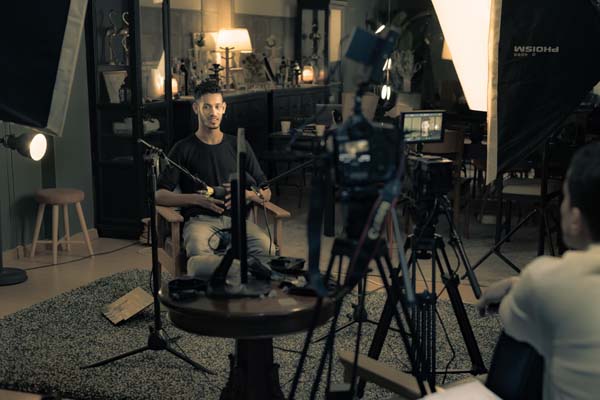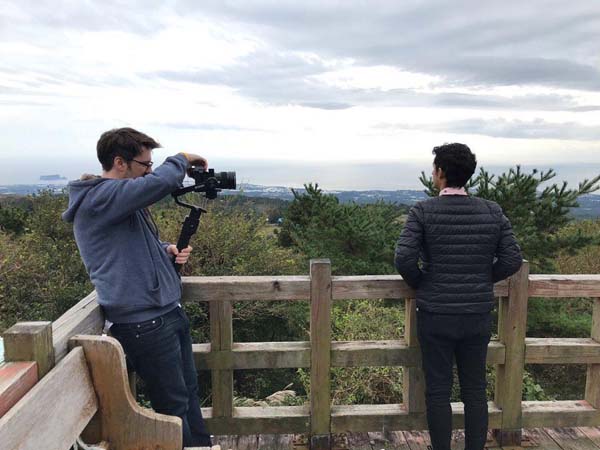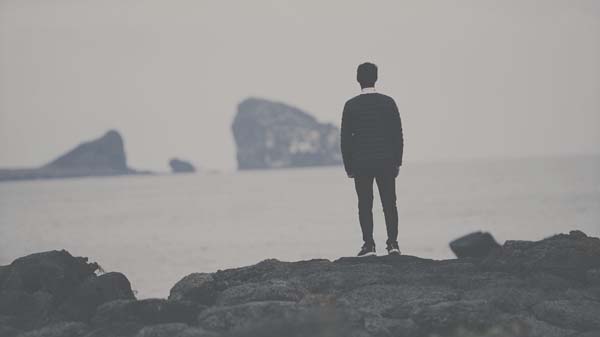Interview with British Filmmaker Neil George PART 1
한국 난민 논쟁에서 소외된 이들을 위한 목소리
영국인 영화제작자 네일 조지(Neil George) 인터뷰 - 1편

Gwangju News (GN): Please introduce yourself to our magazine! What is it that you currently do and where do you currently live?
George: My name is Neil George and I’m a film professor and director from England. I’ve been living in Korea since 2011 teaching film and producing documentaries with various content, mostly related to social and human rights issues.
GN: How did you first come to Korea, and how long have you been living here? Also, what do you think of life here thus far?
George: I first came to Korea in 2005. I wanted to travel around Asia and just ended up in Korea teaching English as a foreign language, but I didn’t really expect to stay that long. However, I really liked the country, people and the food and became very interested in the culture and history as well. The biggest stumbling block was work, as I was only interested in working in film or TV because that was what I did back in England. So after about a year I returned to England to continue working in TV production and completed my MA in broadcasting in 2010.
Then through the various connections I had made in Korea, I fortunately got offered a job teaching documentary and editing at a media university, so I moved here again in 2011.
Since then I’ve been teaching film production as well as producing various films, mostly related to social and human rights issues, as that was what I did in England. Life has had its ups and downs since 2011, but overall, I live quite comfortably here and enjoy making films.
GN: What initially inspired you to pursue a career in film? Have you made previous films in Korea before covering the topic of the Yemeni Refugees?
George: I studied photography at university and got interested in film in my final year, which naturally took me into working in TV production. I love listening to people’s stories and exploring issues, so I was naturally drawn to documentary filmmaking. Since living in Korea I’ve produced and edited 5 feature-length films/documentaries, mostly related to social issues, including While They Watched, a film about North Korean defectors; The Story of Sohn Kee Chung, a biographical piece about the Korean marathon runner who won a gold medal at the 1936 Berlin Olympics; and After the Sewol and Crossroads, two feature documentaries looking at the Sewol ferry tragedy and its aftermath. I’m now producing a documentary, as well as a series of short films, in association with the UNHCR, about the Yemeni refugees who came to Jeju in early 2018 which caused quite a national uproar.
GN: Speaking of which, can you tell us about the inspiration for the Our Journey film series, your most recent project involving the Yemeni refugees who came to Jeju?
George: The main inspiration behind the films was trying to understand the situation more and wanting to listen to the refugees’ stories in more detail. I felt this was missing from the local media when they first came into the country and I wanted to find out more. A fellow filmmaker, Hankyul Kim, asked me to collaborate on a project exploring this in more detail. We initially decided to go to Jeju in search of the refugees and listen to their stories. Fortunately, due to my previous films about the Sewol tragedy, I had a lot of activist contacts who put us in touch with the right people and after listening to a few of the refugees we could see that they weren’t being represented and their stories weren’t being told. I felt extremely disappointed about this, especially after everything I had seen during the 2016?2017 candlelight protests, where the Korean people came together to fight for truth, justice, and equality. I wanted to try and give voice to some of the refugees, so people could have a better understanding of them as well as the situation in Yemen that forced them to flee.
Interview with British Filmmaker Neil George PART 1
Written by Wilson Melbostad
Photographs courtesy of Neil George
The Author
Wilson Melbostad is a human rights attorney hailing from San Francisco, California, who is proud to call Gwangju his second hometown. Wilson is a lecturer at Chonnam National University who, in his spare time, works on various pro bono legal cases throughout the country. Wilson also enjoys breakfast food to the point where he feels comfortable putting such information in his bio.
*This article was originally published in Gwangju News March 2019 issue.
Gwangju News is the first public English monthly magazine in Korea, first published in 2001 by Gwangju International Center. Each monthly issue covers local and regional issues, with a focus on the stories and activities of the international residents and communities. Read our magazine online at: www.gwangjunewsgic.com

-<원문 해석>-
2018년 모국 예맨의 내전을 피해 망명처를 찾아 떠나온 500여명의 난민들의 이야기가 한국 뉴스 헤드라인을 차지했다. 한국 사회 곳곳의 의견들은 사회관계망서비스나 뉴스를 통해 전국으로 퍼졌지만, 이런 소식들이 대개 그렇듯이, 그들을 여기까지 데려온 상황에 대해 예맨 난민 자신들로부터 이야기를 들은 이는 별로 없었다. Gwangju News는 지역의 다큐멘터리 작가 네일 조지 씨와 자리를 함께 했다. 그는 ‘우리의 여행’이라는 제목의 프로젝트를 새로 진행하며 한국사회 안에 포용되고자 계속 활동하고 있는 그들의 목소리를 담아내는 시도를 하고 있다.
광주뉴스(GN): 저희 독자들에게 자기소개를 부탁드리겠습니다. 지금 현재 하고 있는 일은 무엇이고 어디에 살고 있나요?
조지: 제 이름은 네일 조지이고 영국 출신의 영화감독이자 교수입니다. 2011년부터 한국에 살면서 영화를 가르쳐왔고 주로 사회와 인권 이슈에 관계되는 다양한 콘텐츠의 다큐멘터리를 제작해 왔습니다.
GN: 한국에는 처음에 어떻게 오시어, 얼마나 오래 사시게 되었나요? 그리고 지금까지 이곳에서의 삶은 어떤가요?
조지: 한국에 처음 온 건 2005년이었습니다. 아시아를 두루 여행하고 싶었고 마지막에 한국에서 영어를 가르치게 되었는데 이렇게 오래 지내게 될지는 몰랐습니다. 하지만 저는 이 나라와 사람들, 그리고 음식이 정말 좋았고 문화와 역사에도 매우 흥미가 생겼습니다. 그러나 아무래도 영국에서 영화나 TV 일을 해왔기 때문에 그 쪽 분야의 일에만 관심이 있어서인지 직장을 잡는 문제가 제게는 가장 큰 난관이었습니다. 그래서 1년 정도 머무르다가 영국으로 돌아가서 다시 TV 프로그램 제작 일을 했고 2010년에 방송학 석사 과정을 마쳤습니다.
그러다 제가 한국에서 만든 여러 인연들이 계기가 되어, 운 좋게도 한 미디어 대학교에서 다큐멘터리와 편집을 가르치는 일을 제안 받았고 2011년에 다시 한국으로 돌아오게 되었습니다.
그 이후로 주로 제가 영국에서 했던 사회와 인권 문제와 주로 관련된 다양한 영화를 제작하면서 영화 제작을 가르쳐왔습니다. 2011년 이후로 삶이 잘 풀릴 때도, 그렇지 못할 때도 있었지만 대체로 꽤 평안한 삶을 살며 영화 제작을 즐깁니다.
GN: 어떤 계기로 영화 일을 하게 되었나요? 예맨 난민 주제를 다루기 전에 한국에서 만든 이전 작품이 있나요?
조지: 저는 대학에서 사진을 공부했는데 마지막 해에 영화에 관심을 갖게 되었고 자연스럽게 TV 프로그램 제작 일을 하게 되었습니다. 그리고 사람들의 이야기를 듣는 것을 좋아하고 이슈를 찾아보는 것도 좋아해서 자연스럽게 다큐멘터리 영상 제작 일을 하게 되었습니다. 한국에 살게 된 후로는 주로 사회 문제와 관련된 5개의 장편 영화/다큐멘터리를 제작하거나 편집했는데, 탈북자 이야기를 다룬 ‘그들이 보고 있는 동안(While They Watched)’, 1936년 베를린 올림픽 금메달리스트인 한국의 마라토너 손기정 선수의 일대기를 그린 ‘손기정 이야기(The Story of Sohn Kee Chung)’, 세월호의 비극과 그 이후를 그린 두 개의 장편 다큐멘터리 ‘세월호 그 후(After the Sewol)’과 ‘십자로(Crossroads)’가 있습니다. 지금은 유엔난민기구(UNHCR)와 함께 2018년 초에 전국적인 논란을 야기했던 제주도에 온 예맨 난민의 이야기를 다룬 다큐멘터리와 단편 영상 시리즈를 만들고 있습니다.
GN: 그럼 말씀하신 제주도에 온 예맨 난민들을 다룬 가장 최근의 프로젝트 ‘우리의 여행(Our Journey)’ 영상들의 제작 동기를 말씀해 주시겠어요?
조지: 이 영상들을 만들게 된 건 현재의 상황에 대해 조금 더 이해하고 난민들의 이야기를 더 자세히 들어보고 싶어서였습니다. 저는 그들이 처음 이 나라에 왔을 때 나온 국내 매체들의 보도에 뭔가 빠져있다고 느꼈고 이를 더 자세히 알아보고 싶었습니다. 김한결 동료 영화제작자가 이 심층 탐사 프로젝트를 위해 함께 협업하자고 부탁했고, 우리는 우선 제주로 가서 난민들을 찾아보고 그들의 이야기를 들어보기로 결정했습니다. 다행히도 전에 했던 세월호 비극에 대한 영상작업 덕분에 적합한 사람들을 만날 수 있도록 도와줄 많은 활동가들의 연락처를 가지고 있었고, 이를 통해 몇몇 난민들의 이야기를 듣고 난 후 그들이 의사가 적절히 대변되지 못했고 그들의 이야기도 잘 알려지지 못했다는 사실을 알게 되었습니다. 특히 저는 한국인들이 한데 모여 진실과 정의, 평등을 위해 싸웠던 2016년부터 17년까지의 촛불 시위를 지켜보았던 사람으로서 큰 실망감을 느꼈습니다. 사람들에게 이 난민들이 누구인지, 그리고 그들이 도망쳐올 수밖에 없었던 예맨의 상황을 이해할 수 있도록 그들의 목소리를 들려주고 싶어졌습니다.
글=윌슨 멜보스타드
사진=네일 조지
번역=윤영호
작성자
윌슨 멜보스타드는 캘리포니아 샌프란시스코 출신의 인권변호사로 광주가 자신의 두 번째 고향임을 자랑스럽게 생각하는 사람이다. 그는 현재 전남대학교에서 강사로 일하며, 시간이 나는대로 국내 프로보노(사회적 약자를 위한 법률서비스 제공)활동을 하고 있다. 어디든 정보를 탐닉하기 편한 곳에서 아침 식사를 즐기는 사람이기도 하다.
*이 글은 광주뉴스 2019년 3월호에 실린 내용입니다.
광주뉴스는 광주국제교류센터가 2001년에 처음 발행한 대한민국 최초의 영문 대중월간지입니다. 매월 발행되는 각 호에는 지역에 거주하는 외국인과 지역민의 활동, 지역사회의 이야기 및 이슈를 다루고 있습니다. 온라인에서도 잡지를 볼 수 있습니다. (www.gwangjunewsgic.com)


